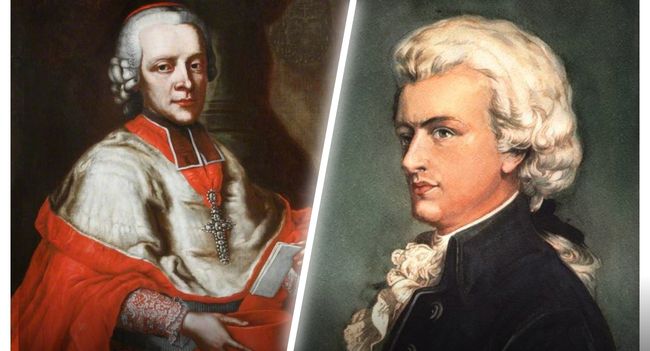Count Arco says goodbye to Mozart

The Composer

The archbishop

A classical composer has a bad day
Wolfgang Amadeus Mozart was fuming, as he stood outside the palace in Vienna, which belonged to his former employer Archbishop, Count Colloredo of Salzburg. He had just been sacked from his position as court organist and to make things worse, the kicking he had just received from the archbishops Chamberlain; Count Arco left it very difficult for him to sit down. The only comfort the bruised and battered composer could take from the situation was that he would never have to be treated like a mere servant again. He might have just lost his position and there was no certainty that he would find another, as he didn’t imagine that the Archbishop would be giving him any references. So here he was, standing in a street in Vienna, no job, no home and a reputation as an over uppity servant. Wolfgang Amadeus Mozart was definitely not having a good day.
The reason why Mozart got sacked and how it was done
So what were the circumstances that led up to the, arguably greatest musical genius ever, feeling that both his posterior and his finances were going to suffer for a while? It all was to do with the inferior position which musicians were expected to occupy in the 18th century.
We are used to artists and composers occupying respected positions in the modern world. Pop stars are treated like royalty and composers and conductors of classical music are among the most respected people in our society. This would not have been the case when young Mozart was growing up. In the houses of the kings and princes, who ruled in Europe at the time, musicians were considered to be just another servant. In fact they were not actually thought of as especially useful servants. A good cook could prepare your food and maids were essential to keeping your house clean, but a musician only really provided some entertainment and perhaps some pleasant background noise to accompany a grand dinner party. A composer or a court orchestra had the same level of utility and value in the 18th century as a good compact disc player has in our time. The Empress Maria Teresa of Austria expressed the prevailing attitude very well in a letter which she wrote to her son Archduke Ferdinand of Modena, when he asked his mother whether he ought to employ Mozart as his court composer.
“You asked me about taking into your service, the young Salzburger. I cannot think what as, for I do not believe that you have any need of a composer or of useless persons. But if it would give you pleasure I will not prevent you. What I say is do not burden yourself with useless persons, and the claims of such persons on your service”.
Needless to say the Archduke did not employ Mozart and his household was not burdened with the extravagance of supporting such a “useless person”.
The Archbishop of Salzburg, who did employ Mozart as his court organist, was no different in his attitude to composers than any of his aristocratic contemporaries. He was the temporal ruler, as well as the spiritual pastor of the Austrian city. He was actually quite advanced in his thinking for an Archbishop. He introduced many liturgical reforms into the church under his jurisdiction and he suppressed many of the more superstitious practices that had grown up in the Catholic religion of his day. Despite his modernising zeal, he still maintained the old-style upper-class belief that musicians and artists were just servants. This did not sit well with the young Wolfgang Amadeus Mozart however. The young composer knew he was a genius and considered that he should be treated with a lot more respect than he was receiving.
This simmering resentment came to a head when the Archbishop took up residence in Vienna and commanded his court organist to attend him in that city. Mozart was required to provide the background entertainment during his employer’s soirées. He was also paraded around most of the palaces in Vienna to play music or conduct his latest compositions for the entertainment of Archbishop Colloredo’s noble buddies. He was not supposed to mix with these grand people however. He was expected to wait in an ante-room until called, then do his piece at the piano or organ and take his dinner in the kitchen with the footmen and scullery maids. Once he caused a scandal by marching up to the Russian ambassador, who he knew, and starting a conversation with him as if he were an equal. Mozart also believed that he was entitled to concert fees for some of these performances, but the Archbishop just considered it was part of his duty to give them, so the composer never received any extra money. This was also a source of great irritation to young Wolfgang. He started making secret plans to leave the archbishops service. In May 1781 the proverbial excrement hit the air agitator. Archbishop Colloredo ordered Mozart to return to Salzburg. The musician, who wanted to stay in Vienna, ignored the command and made no preparations to leave. There followed a very heated argument between the composer and his employer, in which the Prince Archbishop used language which ought not to be uttered by any Prince of the church. Then he summarily dismissed the musician from his presence. Mozart’s reply was that “the pleasure was all his”.
Mozart didn’t formally leave the service of the Archbishop of Salzburg for another month. His father Leopold Mozart tried through Count Arco to smooth things over. But things were not to be smoothed. The composer was finally sacked after a severe dressing down from the Chamberlain and the administering of the kicking that my story started with.
Archbishop Colloredo, Count Arco and Wolfgang Amadeus Mozart today
If you go to Salzburg today, you will see souvenir shops filled with little busts of Wolfgang Amadeus Mozart. Everybody remembers him now and his name is a byword for beauty and sublime grace in music. The great Archbishop of Salzburg, Hieronymus von Paula, Count Colloredo, or his Chamberlain, Count Arco are remembered by few. If their names do swim into the recollection of any person nowadays, it is only because the former disrespected a genius and the latter left the imprint of his boot on the posterior of greatness. History is a very funny thing. You can imagine that you are a giant in your age, but posterity can know you for all the wrong reasons.
If you like “off the wall” comedy, you will LOVE this book

Click here to check out the reviews
Overture to The Magic Flute
The Queen of the Night aria
